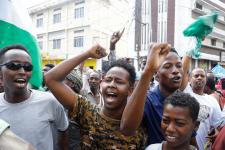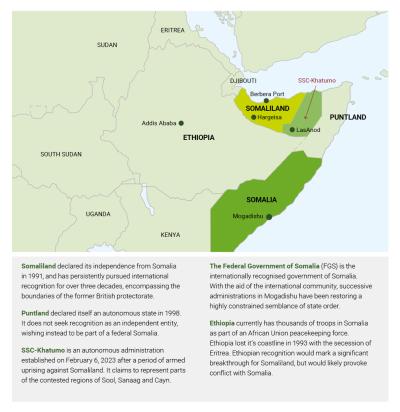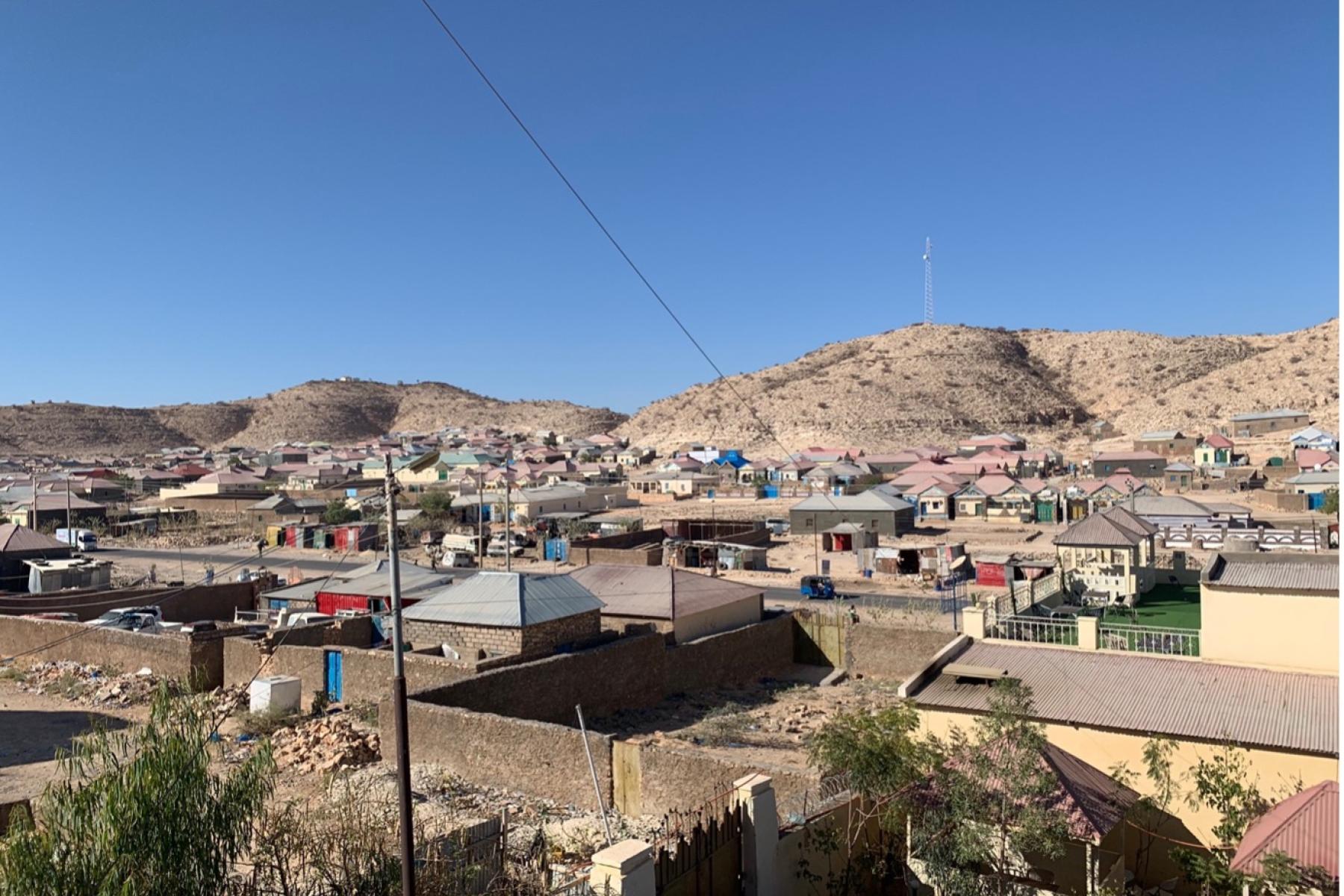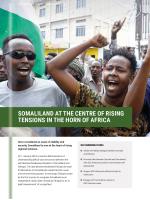Somaliland at the centre of rising tensions in the Horn of Africa

- Initiate immediate dialogue between Somalia and Ethiopia.
- Promote talks between Somalia and Somaliland, with SSC-Khatumo’s position and interests well represented.
- Support SSC-Khatumo’s efforts to build its institutions.
- Engage with humanitarian issues in SSC-Khatumo areas.
On 1 January 2024, a surprise Memorandum of Understanding (MoU) was announced between the self-declared breakaway Republic of Somaliland and Ethiopia. The deal allowed landlocked Ethiopia to lease 20 kilometres of Somaliland’s coastal land for naval and commercial purposes. In exchange, Ethiopia would be the first country to recognise Somaliland as an independent nation (later revised by Ethiopia to an ‘in depth assessment’ of recognition).
The government of the Federal Republic of Somalia (FGS), which considers Somaliland part of its territory, called the deal a violation of its territorial sovereignty, a position supported by the EU and other international partners. In western Somaliland’s Awdal region, where the coastal land has been promised, there have been widespread protests.
The Ethiopia-Somaliland deal has immediately increased tensions throughout the region. The timing of the agreement is significant as it occurred shortly after Somalia agreed to resume talks concerning Somaliland’s disputed constitutional status, putting an abrupt end to the dialogue. Regional blocs are already coalescing between those who support Somalia’s territorial integrity (notably Djibouti, Egypt and Eritrea) and those supporting Ethiopia (including the UAE and Sudan’s Rapid Support Forces). The possibility of a future war in the Horn is a real concern.
Analysis has so far focused on Ethiopia’s expansionist actions, especially in light of a looming debt crisis and various internal conflicts, and support from the UAE, an influential regional player. However, it is unlikely that this deal would have been possible were Somaliland itself not already in crisis. Although the news of the agreement was met with celebration in the capital, Hargeisa, Somaliland is not approaching this deal from a position of strength. Since 2022, it has lost control of a significant portion of its eastern territory to pro-unionist forces who established their own administration, SSC-Khatumo. Internal unrest has also been brewing since 2022 due to delayed Presidential elections in Somaliland. Although President Muse Bihi Abdi has allowed clan elders to mediate the election-related disputes, the opposition remains skeptical as to whether elections will indeed occur by the end of 2024. The aim of the deal with Ethiopia is to restore the President’s reputation, and by extension Somaliland’s international reputation, contain domestic resistance, and revive its battered economy.
Mediating between Somaliland, Somalia and Ethiopia is necessary, but not enough. Addressing the deep-rooted political crisis within Somaliland and clarifying its status in relation to Somalia are essential for finding a long-term solution to regional instability. Resolving the political status of both Somaliland and the newly established SSC-Khatumo should be a top priority in achieving long-term stability in the Horn.
Support for Unionism in the East
SSC-Khatumo’s rejection of Somaliland’s independence claim in favour of reunification with Somalia highlights the disputed nature of the region’s political affiliations and territorial claims. SSC represents the contested regions of parts of Sool, Sanaag and Cayn, strategically located between Somaliland and Puntland, another autonomous region within Somalia. Each side asserts territorial rights, with Somaliland justifying its claims based on historical borders and Puntland basing its claims on dominant clan affiliations, specifically the Darod-Harti clan collective.
In December 2022, a major conflict erupted in Somaliland’s eastern city of Lasanod when anti-government protests escalated into armed conflict between the Somaliland National Army and defence forces from the Dhulbahante clan. This led to the Dhulbahante clan leaders announcing a separate administration, SSC-Khatumo, which rejected Somaliland’s secession and sought to rejoin Somalia. In August 2023, after a seven-month siege, SSC-Khatumo forces defeated Somaliland and assumed control of a significant part of eastern Somaliland.
This conflict has resulted in thousands of casualties on all sides and forced over 180,000 people to flee their homes. As a result, Somaliland’s international reputation has been damaged, and its flagship port, Berbera, has experienced a significant decrease in revenue.
The emergence of SSC-Khatumo has also had an impact on the wider geopolitical landscape, offering hope for a united Somalia and playing a key role in bringing Somaliland to the negotiating table with Somalia, prior to the shock deal with Ethiopia.
Somaliland’s political crisis
Meanwhile, internal political tensions are damaging Somaliland’s democratic credibility and further complicating the delicate clan dynamics. Repeated election delays in Somaliland have significantly undermined the region’s claim to democratic governance, fuelling clan divisions and increasing political tensions. The long overdue presidential elections, along with the violent suppression of dissent and the imprisonment of traditional leaders, have revealed the fragility of Somaliland’s political institutions. At the height of this crisis in June 2023, an armed group calling itself Gacan Libax, launched several attacks on security forces and an international NGO operating in central Somaliland.
Ethiopia’s Red Sea Ambitions
A Somaliland in crisis is an opportunity for Ethiopia. Ethiopia lost sea access in 1993 when Eritrea gained independence. Now, as Ethiopia enters a debt crisis, it is looking for an alternative to the more than USD 1 billion a year it pays to Djibouti for coastal access. The UAE is widely believed to be supporting the deal, as it seeks to expand upon its influence in the Red Sea. The provocative move is also consistent with Abiy Ahmed’s presidency, which has been defined by, and to some extent sustains itself through conflict and crisis. There have been three serious internal conflicts under his tenure (Tigray, Amhara and Oromo).

The Path Ahead: Promoting Peace and Dialogue
A crisis-stricken Somaliland adds unpredictability to an already delicate regional geopolitical balance. Addressing the political crisis within Somaliland and working with SSC-Khatumo as a new political reality are integral to achieving long-term stability in the region.
The conflicts that led to the emergence of SSC-Khatumo have deep-rooted causes, making a return to the previous state highly unlikely. Any attempts by Somaliland to regain control of this territory could potentially trigger a larger civil war. Recognising the influence of SSC-Khatumo would be a significant step towards initiating discussions on peace and stability. Engaging in diplomatic discussions, though difficult due to international norms and relations with the FGS, can still be pursued through unofficial channels.
The upcoming Somaliland presidential elections in November 2024 present an opportunity for a peaceful power transition. If so, they could set the stage for productive tripartite negotiations between Somaliland, Somalia and SSC-Khatumo. Prolonged delays, election malpractices, or meddling by external actors, by contrast, are likely to exacerbate discontent, particularly in the eastern and western regions. Neutral entities distant enough from the conflict, possibly South Africa or even Nigeria, could also play a role in facilitating dialogue between the three parties.
Supporting institution building
The transition of SSC-Khatumo from a state of war to civil governance offers an opportunity for international actors to support institution building and development, including aid directed towards crucial services such as civilian infrastructure, healthcare and education. It is crucial that this aid promotes local ownership and sustainability. There are promising early indications of the establishment of governing institutions in SSC-Khatumo, including a police force and nine ministries. The current president, Abdikhadir Ahmed Aw-Ali ‘Firdhiye’, was elected in August 2023 with 30 votes from the 45 members of the central council. The new administration enjoys strong support from the diaspora, and efforts are underway to balance power among subclans.
Mediating stakeholder relationships
Policymakers can play a crucial role in facilitating dialogues between SSC-Khatumo, Somalia, Somaliland, and other stakeholders (including Puntland) to reduce tensions and explore pathways to peace. In October 2023, the FGS reportedly agreed to recognise SSC-Khatumo as an interim administration, although the relationship between Mogadishu and SSC has been somewhat ambiguous. While there is strong public support for SSC-Khatumo, with many viewing its achievements as a potential catalyst for Somali unity, its introduction as a third Darood clan entity within the federal framework potentially alters the clan balance within the nascent federal system.
DIIS Experts




